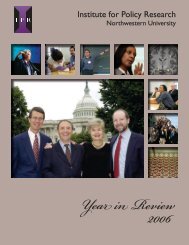Whatever Happened to the Emerging Democratic Majority?
Whatever Happened to the Emerging Democratic Majority?
Whatever Happened to the Emerging Democratic Majority?
Create successful ePaper yourself
Turn your PDF publications into a flip-book with our unique Google optimized e-Paper software.
13<br />
Policy Perspective<br />
S<br />
ocial Security and<br />
Crisis Rhe<strong>to</strong>ric<br />
By Fay Lomax Cook and Jeff Manza<br />
On May 1, President Bush finished a 60-day nationwide <strong>to</strong>ur <strong>to</strong><br />
promote his idea of reforming Social Security and establishing<br />
“personal retirement accounts.” The <strong>to</strong>ur<br />
followed on <strong>the</strong> heels of his Feb. 2 State<br />
of <strong>the</strong> Union where he <strong>to</strong>ld his fellow<br />
Americans that <strong>the</strong> 70-year-old system<br />
would be “exhausted and bankrupt” by<br />
2042.<br />
In his address, he warned that unless<br />
steps were taken, <strong>the</strong>re would be<br />
“drastically higher taxes, massive new<br />
borrowing, or sudden and severe cuts<br />
in Social Security benefits or o<strong>the</strong>r<br />
government programs.”<br />
By <strong>the</strong> end of his <strong>to</strong>ur, Bush was taking<br />
pains <strong>to</strong> reassure those 55 and older that <strong>the</strong>ir Social Security<br />
benefi ts would not be affected by <strong>the</strong> changes, while engaging<br />
in a little bit of soft-shoe backpedaling on <strong>the</strong> extent of <strong>the</strong><br />
proposed privatization.<br />
It is obvious that vociferous opposition <strong>to</strong> <strong>the</strong> reforms and<br />
falling public support had <strong>the</strong>ir effect on <strong>to</strong>ning down White<br />
House talk of a program in crisis. Perhaps less evident is how<br />
<strong>the</strong> political use of crisis rhe<strong>to</strong>ric is deeply problematic.<br />
The language of crisis rhe<strong>to</strong>ric is used almost daily <strong>to</strong> grab<br />
our attention. Policy entrepreneurs fan <strong>the</strong> fl ames of crisis—<br />
failing public schools, terrorists in our subways and shopping<br />
malls, burgeoning government budget deficits, foreign takeovers<br />
of homegrown companies, skyrocketing medical costs, <strong>the</strong><br />
breakdown of traditional family values, and on and on.<br />
Cynics point out this is par for <strong>the</strong> course in policy debates.<br />
Indeed, surly exchanges on late-night news have become a<br />
staple of every American’s media diet.<br />
Our politicians have become experts at using crisis-mode<br />
language <strong>to</strong> frame debate over Social Security’s long-term<br />
problems and call for reforms—even when <strong>the</strong> outlook is<br />
exceedingly good and Social Security benefi ts can continue<br />
<strong>to</strong> be paid in full until 2042 when 73 percent of benefi ts can<br />
be paid.<br />
Consider that in 1983 Congress passed an amendment that<br />
included raising payroll taxes and gradually increasing <strong>the</strong> age<br />
of eligibility for full benefi ts <strong>to</strong> keep Social Security solvent.<br />
The adjustments worked so well that analysts calculated <strong>the</strong>y<br />
would generate a half-a-trillion-dollar surplus by 2015. For<br />
those sounding <strong>the</strong> alarm, however, <strong>the</strong> surplus resulted from<br />
an overly restrained fi scal policy that would eventually sink<br />
<strong>the</strong> country in<strong>to</strong> recession.<br />
This, of course, turned out not <strong>to</strong> be <strong>the</strong> case.<br />
Forecasting is always risky business—especially in <strong>the</strong> case of<br />
Social Security where projections almost<br />
always understate long-term economic<br />
growth and exaggerate <strong>the</strong> system’s<br />
vulnerability.<br />
So why do politicians and pundits<br />
continue <strong>to</strong> wave <strong>the</strong> crisis fl ag—not<br />
just for Social Security but a multitude<br />
of o<strong>the</strong>r equally complex and longterm<br />
structural problems in <strong>the</strong> United<br />
States?<br />
To some extent, <strong>the</strong>y do it because it<br />
does work. Psychologists know that panic<br />
negatively affects cognitive processing<br />
and decision-making. And so it is with <strong>the</strong> crisis rhe<strong>to</strong>ric. We<br />
debate <strong>the</strong> terms of policy proposals differently and can more<br />
easily be persuaded that something must be done, whe<strong>the</strong>r<br />
we really need <strong>to</strong> or not.<br />
The problem is that such dis<strong>to</strong>rted debate can lead <strong>to</strong> actions<br />
that are more often regrettable than not. Witness how <strong>the</strong><br />
war on drugs, launched by President Reagan, led <strong>to</strong> policies<br />
that have America’s prisons overfl owing at vast taxpayer and<br />
social expense. Yet 20 years later drug use remains virtually<br />
unchanged.<br />
With regard <strong>to</strong> Social Security, <strong>the</strong> danger of crisis rhe<strong>to</strong>ric<br />
is that it causes <strong>the</strong> public <strong>to</strong> lose faith in programs based on<br />
long-term expectations. From one generation <strong>to</strong> <strong>the</strong> next, we<br />
expect adjustments <strong>to</strong> be made in a fair and prudent manner.<br />
By chipping away at <strong>the</strong> public’s psychological sense of security<br />
and faith in <strong>the</strong>se programs, exaggerated and misleading claims<br />
needlessly create a climate of “social insecurity.”<br />
While a mora<strong>to</strong>rium on <strong>the</strong> use of “crisis” in political<br />
rhe<strong>to</strong>ric would be welcome, its use may simply be <strong>to</strong>o tempting<br />
for enterprising reformers (of whatever ideological stripe) <strong>to</strong><br />
give it up. But if citizens at least recognize such claims for what<br />
<strong>the</strong>y are—manipulative ra<strong>the</strong>r than analytical—more informed,<br />
sober public debates might follow.<br />
Fay Lomax Cook is professor of human development and social<br />
policy and direc<strong>to</strong>r of <strong>the</strong> Institute for Policy Research. Jeff Manza<br />
is professor of sociology and was IPR’s acting direc<strong>to</strong>r in 2004-05.<br />
This edi<strong>to</strong>rial was based on ones <strong>the</strong>y originally wrote for <strong>the</strong><br />
Chicago Tribune on May 10, 1988 and February 20, 2005.
















